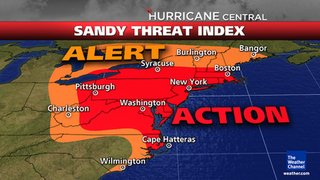Hurricane Sandy Could Catalyze Recession
Widespread destruction and disruption is expected across the most widely populated part of the nation, the Northeastern United States, starting this weekend. Hurricane Sandy will meet a deep arctic low cold front at the Jet Stream to perhaps generate the storm of the century for the Northeast Region of the United States. Imagine “The Perfect Storm” but over land instead of the Atlantic Ocean. Power outages are likely, tree falls should be commonplace, flooding widespread and high winds will strike areas unaccustomed to it, perhaps resulting in severe structural damage. A four to eight foot storm surge is expected as a full moon lifts tides as well. A foot of rain may fall in some areas, as high winds batter the East Coast.
Our founder earned clients a 23% average annual return over five years as a stock analyst on Wall Street. "The Greek" has written for institutional newsletters, Businessweek, Real Money, Seeking Alpha and others, while also appearing across TV and radio. While writing for Wall Street Greek, Mr. Kaminis presciently warned of the financial crisis.
Public sector spending will fill the pockets of emergency workers putting in overtime hours and fill up the tanks of fuel and equipment suppliers. Construction materials suppliers should benefit as well, including the likes of retailers Home Depot (NYSE: HD) and Lowes (NYSE: LOW), and other construction materials companies like USG (NYSE: USG) and Builders FirstSource (Nasdaq: BLDR).
Still, business will come to a halt generally for a day to a week or more across a vast and important region of the U.S. That means fewer hours billed by lawyers, less frozen yogurts sold at the local shop, land bound fishermen with empty nets, unfilled barbershop chairs, and increased absenteeism across all business sectors. Thus, the net result should be a significant negative impact to fourth quarter GDP, and perhaps a catalyst for recession, given the vulnerable state of the economy. The broader markets have not had an opportunity to price in this quickly developing event, and so the SPDR S&P 500 ETF (NYSE: SPY) could take a hit next week as well, which strikes at the pockets of all Americans. Yes, Hurricane Sandy, potentially the storm of the century for the Northeast, could be a catalyst for recession.
Please see our disclosures at the Wall Street Greek website and author bio pages found there. This article and website in no way offers or represents financial or investment advice. Information is provided for entertainment purposes only.

Our founder earned clients a 23% average annual return over five years as a stock analyst on Wall Street. "The Greek" has written for institutional newsletters, Businessweek, Real Money, Seeking Alpha and others, while also appearing across TV and radio. While writing for Wall Street Greek, Mr. Kaminis presciently warned of the financial crisis.
Hurricane Sandy Recession
Northeastern U.S. residents will not likely leave home for a day or two or more depending on how well power holds up, and so discretionary spending at Macy’s (NYSE: M), Darden Restaurants (NYSE: DRI) and the like will be impacted. Though fast food providers like McDonald’s (NYSE: MCD) and Yum! Brands (NYSE: YUM) and supply stores like Wal-Mart (NYSE: WMT), Costco (Nasdaq: COST) and Sears (Nasdaq: SHLD) perhaps benefit ahead of the battle. Overall, while there will be a surge of spending for emergency items and groceries, such non-discretionary spending should be followed by a lull in shopping for similar items in the weeks that follow, leveling out the impact to the quarter.Public sector spending will fill the pockets of emergency workers putting in overtime hours and fill up the tanks of fuel and equipment suppliers. Construction materials suppliers should benefit as well, including the likes of retailers Home Depot (NYSE: HD) and Lowes (NYSE: LOW), and other construction materials companies like USG (NYSE: USG) and Builders FirstSource (Nasdaq: BLDR).
Still, business will come to a halt generally for a day to a week or more across a vast and important region of the U.S. That means fewer hours billed by lawyers, less frozen yogurts sold at the local shop, land bound fishermen with empty nets, unfilled barbershop chairs, and increased absenteeism across all business sectors. Thus, the net result should be a significant negative impact to fourth quarter GDP, and perhaps a catalyst for recession, given the vulnerable state of the economy. The broader markets have not had an opportunity to price in this quickly developing event, and so the SPDR S&P 500 ETF (NYSE: SPY) could take a hit next week as well, which strikes at the pockets of all Americans. Yes, Hurricane Sandy, potentially the storm of the century for the Northeast, could be a catalyst for recession.
Please see our disclosures at the Wall Street Greek website and author bio pages found there. This article and website in no way offers or represents financial or investment advice. Information is provided for entertainment purposes only.

Labels: Economy, Economy-2012-Q4, Editors_Picks, Editors-Picks-2012-10, Syndicate













0 Comments:
Post a Comment
<< Home